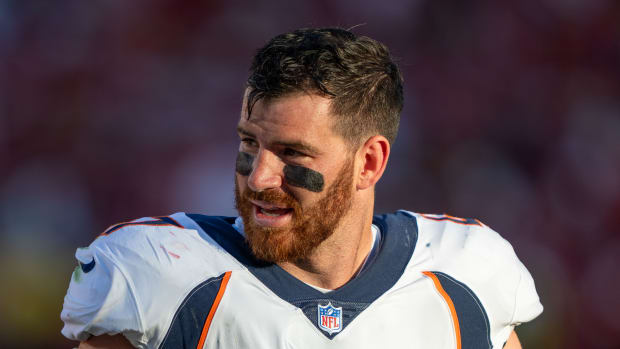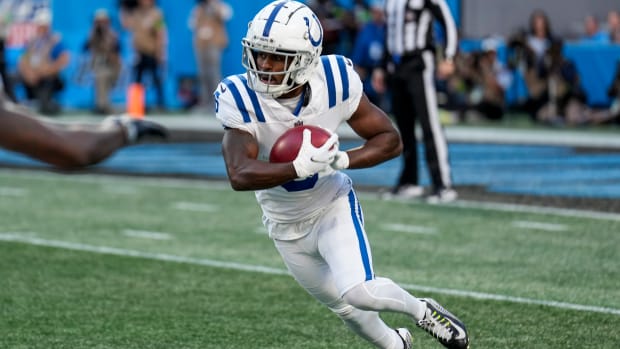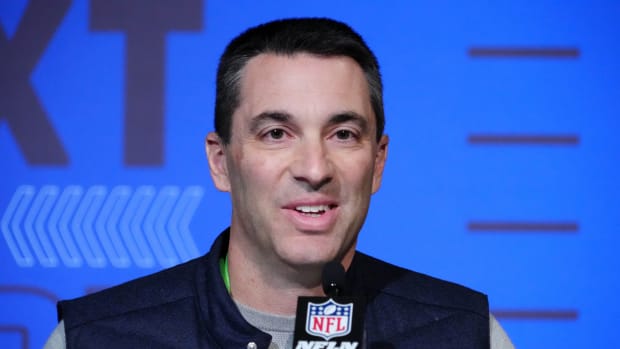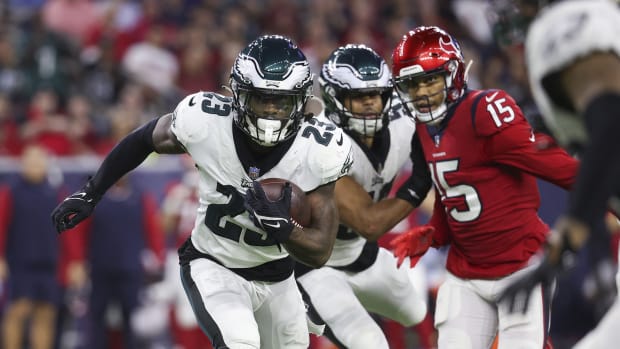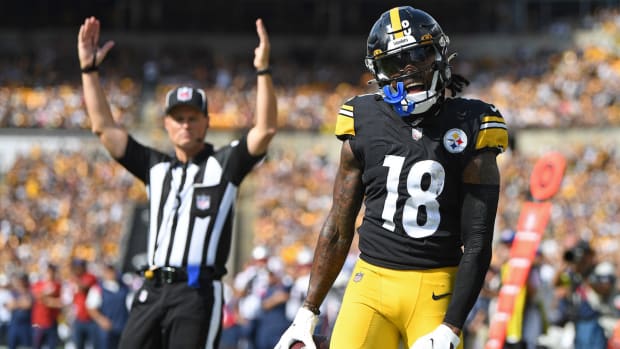Should the NFL Place Antonio Brown on the Commissioner’s Exempt List?
The New England Patriots are set to play the Miami Dolphins this Sunday at 1 p.m. ET. Will Antonio Brown be an eligible receiver for Tom Brady?
As of this writing, this answer appears to be yes—but it is hardly a foregone conclusion.
Brown, as detailed on The MMQB, has been sued by his former trainer, Britney Taylor, for sexual battery and related claims. Taylor, a former gymnast and operator of a training center in Memphis, claims that Brown raped her in his Miami home last year and inflicted other sexual harms against her in his Pittsburgh home in 2017.
Taylor’s complaint also includes screenshots of what her attorney describes as text messages sent by Brown to Taylor. In those purported texts, Brown seems threatening and volatile, and he also directs obscenities at Taylor. At this time, those messages have not been authenticated. Also, the context is unclear as they appear to be parts of longer “back-and-forth” conversations.
Through his representatives, Brown categorically rejects the accusations of sexual misconduct. Brown’s camp depicts Taylor as knowingly lying about her relationship with Brown in order to inflict harm on his NFL career. Brown’s camp also contends that Taylor is vengeful because Brown refused to invest $1.6 million in a business project that is depicted as a scheme to purchase property owned by Taylor and her mother. As to the alleged rape, representatives for Brown insist that it was consensual sex.
It does not appear that Taylor notified the Miami Police Department about her rape accusation, nor does it appear that she sought hospitalization services in the immediate aftermath. Taylor’s complaint asserts that she suffered significant emotional trauma and accompanying physical distress. Her complaint also suggests that she was able to go public with her account only after receiving counseling and other health services. Still, it is unexplained why, after feeling able to go public with her accusations, Taylor did not report the incident to the police but instead filed a lawsuit. Regardless, her civil complaint provides the Miami Police Department notice of the rape allegation. The police could now investigate and request to speak with Taylor and Brown. At this time, there is no indication that an investigation will take place.
U.S. District Judge Rodney Smith, a former prosecutor who President Donald Trump nominated to the court in April and who took office in July, will be the presiding judge.
Breaking down whether the NFL will place Brown on the Commissioner’s Exempt List
The NFL and Patriots face a quandary. They have little time to verify or refute either Taylor’s claims or Brown’s rebuttal before Sunday. ESPN’s Adam Schefter reports that Taylor intends to interview with NFL investigators next week, but any interview would occur after the Patriots-Dolphins game.
Still, the rape accusation against Brown is damning, particularly for a league that has been criticized for its handling of domestic violence and sexual assault matters. The league may be more inclined to take swift action given the optics. Along those lines, the NFL is not a court system beholden to assurance of absolute fairness. At the end of the day, the NFL is an entertainment company that attempts to maximize its brand with consumers. The NFL is also financed in part through sponsorships. As a general matter, sponsors do not want the league featuring players who are associated with sexual assault.
On the other hand, the accusations against Brown lack corroboration—at least at this time. Claims contained in a civil lawsuit are, by their very nature, unproven. They are sometimes exaggerated or even knowingly untrue (which can lead to court sanctions). Occasionally lawsuits are filed in hopes that they will rattle the defendant and induce the defendant to agree to settlement terms before the claims are subject to significant scrutiny. Based on what is currently known, Taylor has not provided sworn testimony about her accusations. Such testimony would be subject to the criminal penalty of perjury and thus appear more credible than unsworn statements. A lack of police investigation is also significant. The NFL can’t seek a written narrative provided by officers who looked into Taylor’s assertions since there was no investigation.
The NFL could—but not necessarily should—place Brown on the commissioner’s exempt list. Placement on the list would prohibit Brown from playing in games or practicing. However, he would continue to be paid and maintain access to other employment benefits. Brown would also be able to participate in Patriots meetings and work out individually at Gillette Stadium.
As worded, the exempt list contemplates two scenarios where a player could be placed on it.
The first is inapplicable to Brown: when a player is formally charged with a crime of violence. Brown has not been charged with a crime and there is no reason to believe that he will be charged. Allegheny County District Attorney Stephen Zappala has told media that his office will “take a look” at Taylor’s allegations related to alleged criminal acts that took place in Brown’s home in Pittsburgh in 2017. There is no indication at this time that Miami law enforcement is looking into the matter, though that could change. Either way, Brown would not be charged with a crime unless there is probable cause.
The second scenario might be applicable: when an investigation leads Goodell to believe that a player “may have” engaged in a crime of violence. This second scenario suggests a low and undefined floor to justify placement on the list. This is particularly clear with use of the phrase “may have” and its link to Goodell having to discretion to decide when it applies. Also, the language does not indicate how thorough of an investigation the league needs to conduct.
Even then, the league might conclude it can’t conduct a sensible investigation before Sunday’s game. As mentioned above, Taylor has agreed to speak with the NFL as early as next week, so the NFL and its attorneys can’t question her prior to Sunday.
That said, it’s possible that Taylor could share with NFL investigators electronic records, such as other texts and messages from Brown, and Goodell might find those records instructive (though Goodell declined to punish Kansas City Chiefs wide receiver Tyreek Hill despite Hill warning his former fiancée, Crystal Espinal, “you need to be afraid of me too, b----.” The league could also question Brown before Sunday.
Furthermore, the NFL could seek to identify and question the unnamed player mentioned in Taylor’s complaint. The complaint references a football player as being in or near the house where the alleged rape occurred. If this person is an NFL player and if the NFL learns of his identity, the league could demand that he answer questions. He would be obligated to comply with a league investigation per CBA and player contract duties.
Most likely, the league will wait on deciding whether to place Brown on the exempt list until after it has an opportunity to hear directly from Taylor and gather other information.
Brown could file a grievance over his placement on the Exempt List, but he’d likely lose
If Brown is placed on the exempt list, he and the NFLPA could file a grievance under Article 46 of the CBA to protest his placement. Article 46 is the league’s personal conduct policy. It has attracted considerable attention in recent years. Article 46 is the section of the CBA that authorized Goodell to punish Dallas Cowboys running back Ezekiel Elliott and Pittsburgh Steelers quarterback Ben Roethlisberger for allegations of sexual assault. Goodell suspended both players for six games (Roethlisberger’s suspension was later reduced to four games) despite neither player being charged with a crime, let alone convicted of one.
Under Article 46, Goodell has complete discretion to determine if a player has engaged in conduct detrimental to the league and if so, an appropriate punishment. Article 46 also designates Goodell as the default arbitrator for appeals. Stated differently, Goodell has conclusive authority over how the league finds facts, punishes players and reviews those punishments.
Brown would face long odds if he appealed Goodell placing him on the exempt list. First off, Brown would be appealing to the same person who believed it was appropriate to place him on the list. This is why an “appeal” under Article 46 is more like a request for reconsideration. Goodell could delegate oversight of the appeal to another person, but that person would be picked by Goodell. Consequently, he or she, like Goodell, would not be neutral.
Second, placement on the exempt list is not as detrimental to a player’s career as would be a suspension. The player continues to be paid his contract. Further, the league has not reached a finding that the player violated Article 46.
In response, Brown could insist that placement on the exempt list would be professionally damaging. He would maintain that he would suffer “irreparable harm”, meaning a kind of harm that can’t later be cured if he is vindicated.
For one, he would be denied a chance to play in games that will never be replayed. This will prevent him from accumulating catches, receiving yards and other statistics for the 2019 season and for his NFL career. He would become less likely to honored as an All-Pro wide receiver and less likely to obtain other awards and distinctions.
Second, the denial of a chance to play could have a detrimentally cumulative effect on Brown’s season. Brown has not yet played in a game with Brady. Brown is more likely to develop a rapport with Brady the more games that the two play together. Brown also joins a talented Patriots wide receiving corps that has an established relationship with Brady. Julian Edelman, Josh Gordon and Phillip Dorsett are all favorite targets of the legendary quarterback. Although Brown is the most accomplished of the group, he’ll need to gain Brady’s trust at a time when Brady has other skilled receivers to target.
Third, Brown could still lose money—potentially a lot of money—despite the fact that he would still be paid while on the exempt list. According to Ian Rapoport of the NFL Network, Brown’s contract contains an incentive clause whereby he would be paid $1.5 million for meeting each of the following criteria: 105 catches, 1,298 yards or 16 touchdowns. Brown has already missed Week 1 due to the timing of his signing with the Patriots. If he misses additional weeks, he would become even less likely to reach those statistical thresholds.
Goodell, however, would be poised to dismiss these arguments. Players miss games for a variety of reasons and the NFL has historically not regarded such absences as irreparable harm. Also, the fact that Brown signed a contract with incentive clauses means he accepted the risk that he would not earn those incentives. Indeed, those clauses are, by their very nature as incentives, not guaranteed.
If Brown appealed and lost, he could in theory petition a federal court to vacate the award (ruling). Such an effort would probably fail. NFL players have consistently lost attempts to convince federal judges to vacate NFL arbitration awards. Tom Brady, Adrian Peterson and Elliott all tried and, ultimately, all lost their court battles. Courts are generally unwilling to vacate awards given the high deference courts are obligated to offer to arbitrators and given the permissive language offered to Goodell in the CBA. Brown would have to prove that his placement on the exempt list was arbitrarily determined. The league would likely be able to extinguish that argument by stressing the available facts and the league’s collectively bargained discretion.
The Patriots dilemma
Apart from if and when the NFL decides to make Brown ineligible, the Patriots and head coach Bill Belichick must decide whether to play Brown while he is civilly accused of sexual assault. Unless it is dismissed early or unless Taylor and Brown reach a settlement out of court, Taylor’s lawsuit will likely take months to play out. Given the deliberate pace of federal litigation and the busy dockets of federal judges, the case could easily last into 2020.
The Patriots could decide to play Brown for as long as he is NFL eligible. Brown practiced with the team on Wednesday and Thursday, which is a tentative sign Belichick intends to play him on Sunday. The Patriots also likely don’t know anything more than the NFL about the Taylor-Brown situation. The team knows that Brown has been sued for behavior that his representatives say didn’t happen.
The Patriots are also playing a player who has been charged with a felony. Last month, a New Hampshire grand jury indicted safety Patrick Chung with felony possession of cocaine. The cocaine was found in a home for which Chung is listed as the owner (the cocaine was not found on Chung, but he might nonetheless be responsible due to constructive possession). Chung will have a court hearing in November; the case could last well into 2020. Obviously, an accusation of drug possession is far less troubling than an accusation of rape. But whereas Brown has only been sued in a lawsuit, Chung faces a criminal charge. The Patriots’ willingness to play Chung while he is accused of misconduct could suggest the team is more likely to play Brown during this new controversy.
Michael McCann is SI’s Legal Analyst. He is also an attorney and Director of the Sports and Entertainment Law Institute at the University of New Hampshire Franklin Pierce School of Law.
Question or comment? Email us at talkback@themmqb.com.
































